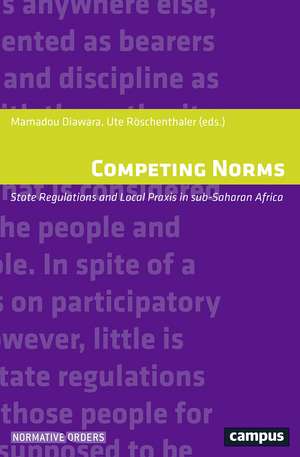Competing Norms: State Regulations and Local Praxis in sub-Saharan Africa: Normative Orders, cartea 19
Editat de Mamadou Diawara, Ute Röschenthaleren Limba Engleză Paperback – 6 apr 2017
States in sub-Saharan Africa, as anywhere else, are vested with the authority to implement laws and sanction their application. But in spite of a growing emphasis in Africa on participatory approaches to legislation, little research has focused on the extent to which the public has become involved in policy making and whether the state regulations that have been produced have proven publicly beneficial. Offering a new anthropological perspective, Competing Norms fills that gap by exploring how people in sub-Saharan Africa view new regulations in the light of preexisting local norms with which new regulations often compete. A collection of international, interdisciplinary contributors discusses the competing local, state, and international norms as they have evolved over time, unfolding the intricate ambivalences and contradictions that often characterize state regulations.
Preț: 175.38 lei
Preț vechi: 218.40 lei
-20% Nou
Puncte Express: 263
Preț estimativ în valută:
33.56€ • 35.14$ • 27.83£
33.56€ • 35.14$ • 27.83£
Carte indisponibilă temporar
Doresc să fiu notificat când acest titlu va fi disponibil:
Se trimite...
Preluare comenzi: 021 569.72.76
Specificații
ISBN-13: 9783593506531
ISBN-10: 359350653X
Pagini: 271
Ilustrații: 1 line drawing, 2 maps
Dimensiuni: 140 x 215 x 28 mm
Greutate: 0.34 kg
Editura: CAMPUS VERLAG
Colecția Campus Verlag
Seria Normative Orders
ISBN-10: 359350653X
Pagini: 271
Ilustrații: 1 line drawing, 2 maps
Dimensiuni: 140 x 215 x 28 mm
Greutate: 0.34 kg
Editura: CAMPUS VERLAG
Colecția Campus Verlag
Seria Normative Orders
Notă biografică
Mamadou Diawara is professor of African anthropology at Goethe-Universität Frankfurt. Ute Röschenthaler is professor of social and cultural anthropology at the Johannes Gutenberg University in Mainz, Germany. Together they are the coeditors of Copyright Africa: How Intellectual Property, Media and Markets Transform Immaterial Cultural Goods.















